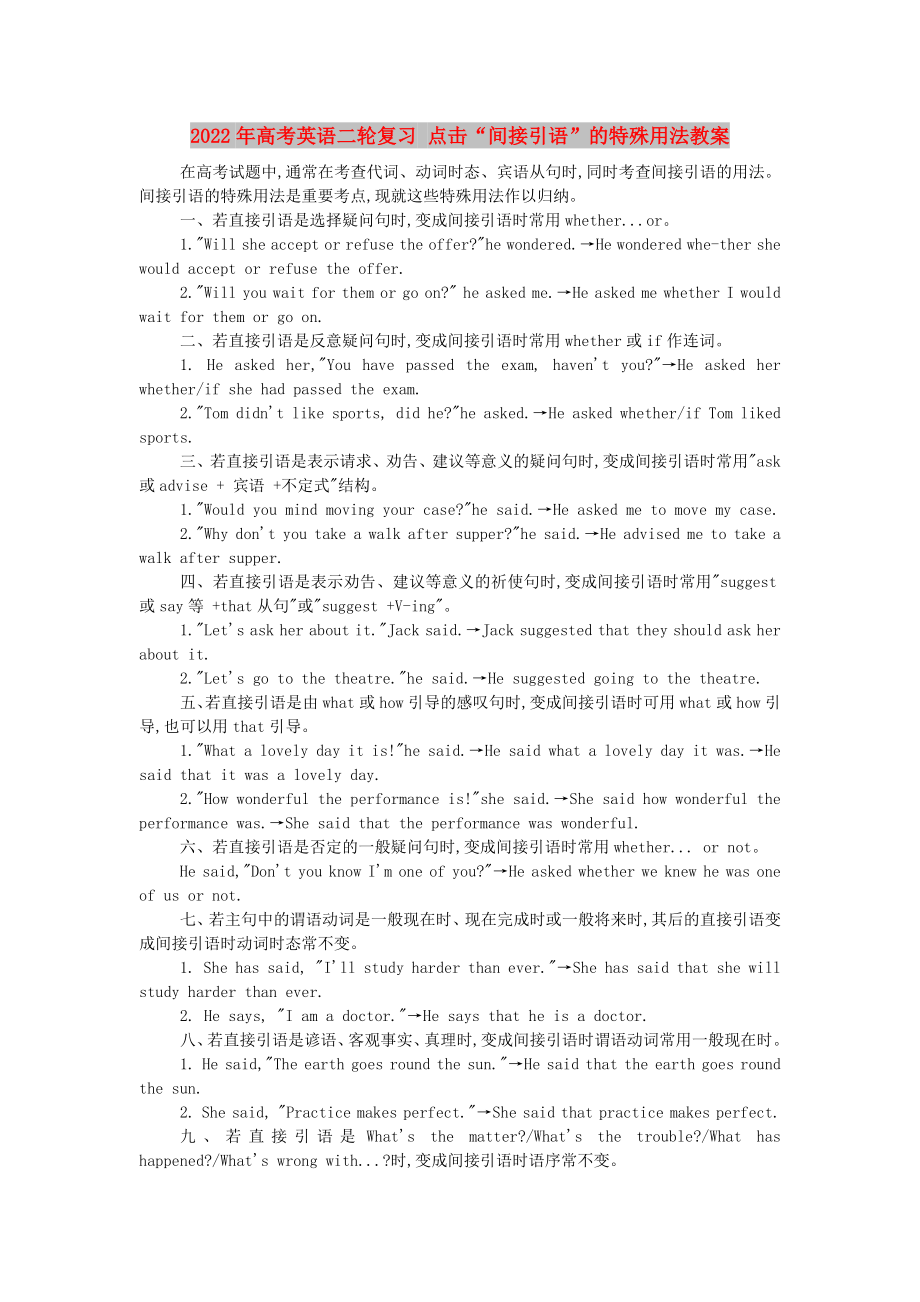《2022年高考英語二輪復(fù)習(xí) 點(diǎn)擊“間接引語”的特殊用法教案》由會(huì)員分享����,可在線閱讀��,更多相關(guān)《2022年高考英語二輪復(fù)習(xí) 點(diǎn)擊“間接引語”的特殊用法教案(2頁珍藏版)》請(qǐng)?jiān)谘b配圖網(wǎng)上搜索�。
1、2022年高考英語二輪復(fù)習(xí) 點(diǎn)擊“間接引語”的特殊用法教案
在高考試題中,通常在考查代詞�、動(dòng)詞時(shí)態(tài)、賓語從句時(shí),同時(shí)考查間接引語的用法����。間接引語的特殊用法是重要考點(diǎn),現(xiàn)就這些特殊用法作以歸納。
一���、若直接引語是選擇疑問句時(shí),變成間接引語時(shí)常用whether...or����。
1."Will she accept or refuse the offer?"he wondered.→He wondered whe-ther she would accept or refuse the offer.
2."Will you wait for them or go on?" he asked
2����、me.→He asked me whether I would wait for them or go on.
二���、若直接引語是反意疑問句時(shí),變成間接引語時(shí)常用whether或if作連詞�����。
1. He asked her,"You have passed the exam, haven't you?"→He asked her whether/if she had passed the exam.
2."Tom didn't like sports, did he?"he asked.→He asked whether/if Tom liked sports.
三�、若直接引語是
3、表示請(qǐng)求��、勸告���、建議等意義的疑問句時(shí),變成間接引語時(shí)常用"ask或advise + 賓語 +不定式"結(jié)構(gòu)��。
1."Would you mind moving your case?"he said.→He asked me to move my case.
2."Why don't you take a walk after supper?"he said.→He advised me to take a walk after supper.
四��、若直接引語是表示勸告����、建議等意義的祈使句時(shí),變成間接引語時(shí)常用"suggest或say等 +that從句"或"suggest +V-ing
4����、"。
1."Let's ask her about it."Jack said.→Jack suggested that they should ask her about it.
2."Let's go to the theatre."he said.→He suggested going to the theatre.
五��、若直接引語是由what或how引導(dǎo)的感嘆句時(shí),變成間接引語時(shí)可用what或how引導(dǎo),也可以用that引導(dǎo)����。
1."What a lovely day it is!"he said.→He said what a lovely day it was.→H
5�����、e said that it was a lovely day.
2."How wonderful the performance is!"she said.→She said how wonderful the performance was.→She said that the performance was wonderful.
六�����、若直接引語是否定的一般疑問句時(shí),變成間接引語時(shí)常用whether... or not�。
He said,"Don't you know I'm one of you?"→He asked whether we knew he was one of
6�、 us or not.
七、若主句中的謂語動(dòng)詞是一般現(xiàn)在時(shí)�、現(xiàn)在完成時(shí)或一般將來時(shí),其后的直接引語變成間接引語時(shí)動(dòng)詞時(shí)態(tài)常不變。
1. She has said, "I'll study harder than ever."→She has said that she will study harder than ever.
2. He says, "I am a doctor."→He says that he is a doctor.
八�����、若直接引語是諺語�、客觀事實(shí)、真理時(shí),變成間接引語時(shí)謂語動(dòng)詞常用一般現(xiàn)在時(shí)�����。
1. He said,"The earth goes r
7�、ound the sun."→He said that the earth goes round the sun.
2. She said, "Practice makes perfect."→She said that practice makes perfect.
九、若直接引語是What's the matter?/What's the trouble?/What has happened?/What's wrong with...?時(shí),變成間接引語時(shí)語序常不變���。
1. "What's the matter?"said he.→He asked me what was the matter.
2. "What has happened?"said she.→She asked me what had happened.
 2022年高考英語二輪復(fù)習(xí) 點(diǎn)擊“間接引語”的特殊用法教案
2022年高考英語二輪復(fù)習(xí) 點(diǎn)擊“間接引語”的特殊用法教案

